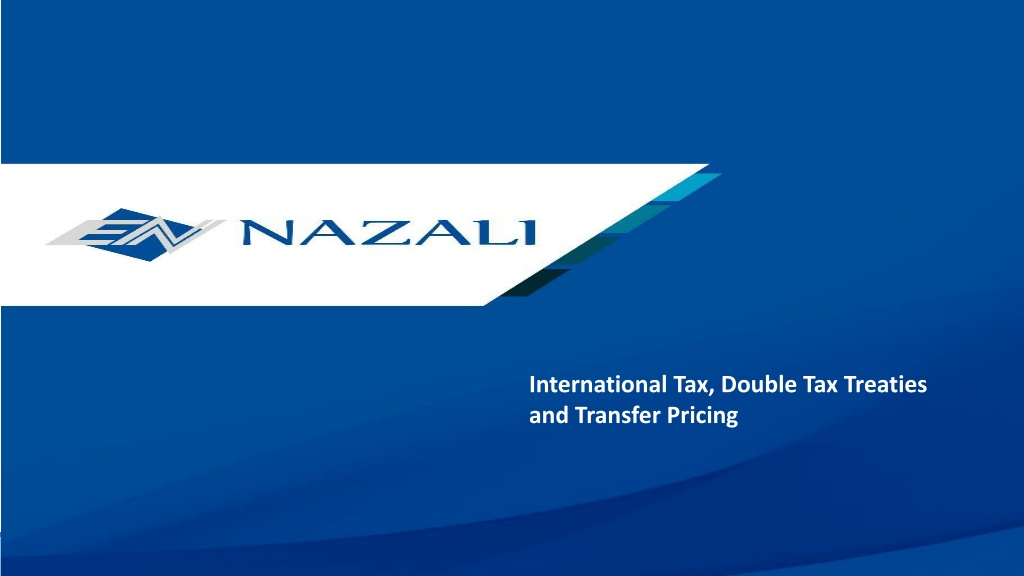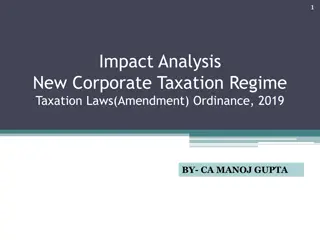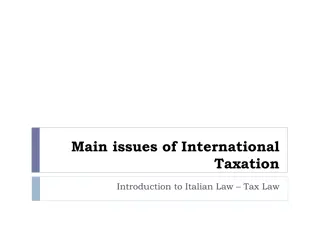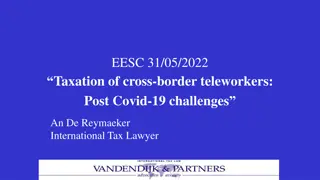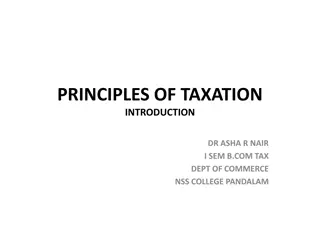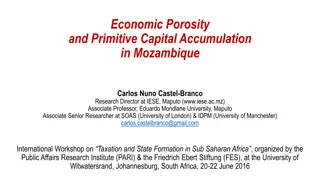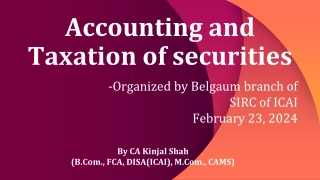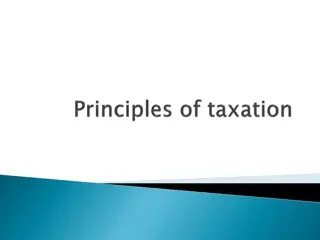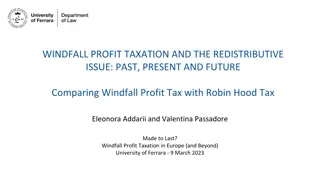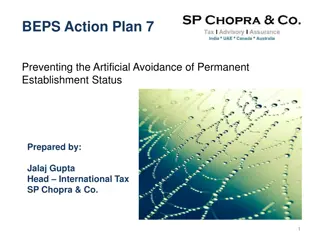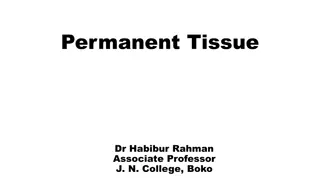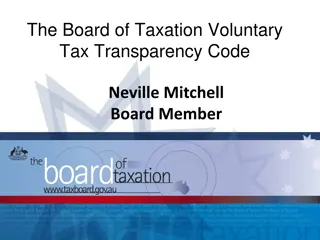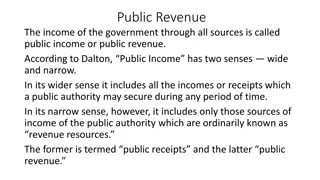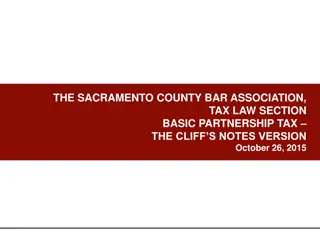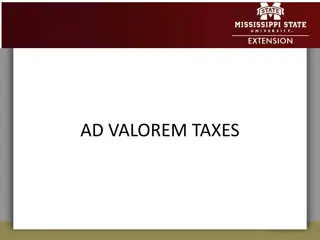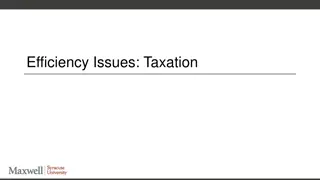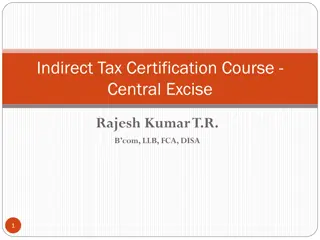Understanding Permanent Establishments in International Taxation
Permanent establishments play a crucial role in determining tax liabilities for companies operating across borders. In Turkish corporate taxation, limited liability taxpayers are defined by their place of business and permanent representatives. The OECD Model Convention also provides guidelines on what constitutes a permanent establishment. Understanding these concepts is essential for navigating double tax treaties and transfer pricing regulations.
- Permanent Establishment
- International Taxation
- Double Tax Treaties
- Transfer Pricing
- OECD Model Convention
Download Presentation

Please find below an Image/Link to download the presentation.
The content on the website is provided AS IS for your information and personal use only. It may not be sold, licensed, or shared on other websites without obtaining consent from the author. Download presentation by click this link. If you encounter any issues during the download, it is possible that the publisher has removed the file from their server.
E N D
Presentation Transcript
International Tax, Double Tax Treaties and Transfer Pricing
Permanent Establishment Permanent Establishment According to Article 3 of the Corporate Income Tax Code no. 5520 ( CITC ), the liability status of CITC taxpayers is categorized under two concepts as fullliability and limitedliability . Companies whose legal or business headquarters (as stated in their articles of association) are located in Turkey or whose operations are centered and managed in Turkey are classified as fully liable companies (resident companies) and these companies are subject to CIT in Turkey over their worldwide income. Limited liable companies are defined as the companies whose legal and business headquarters are not located in Turkey (non- resident companies) and the business income generated by non-resident companies through a fixed place of business (permanent establishment) or a permanent representative in Turkey is subject to CIT.
Permanent Establishment Permanent Establishment Two concepts, place of business and the permanent representative , which are of crucial importance in the determination of commercial earnings from the perspective of Turkish corporate taxation for limited liable taxpayers, are defined in the Tax Procedure Code and Income Tax Code. The definition of place of business is given in the Article 156 of Tax Procedure Code ( TPC ) as in commercial, industrial, agricultural or professional activity; place of businesses are the premises assigned to the practice of a commercial, industrial, agricultural or professional activity or used for these activities such as shops, offices, consulting-rooms workshops, branches, stores, hotels, coffee houses, entertainment places, playing places, fields, vine orchards, farms, breeding stations, fishing places, mines, quarries or building yards . place of business On the other hand, the definition of permanentrepresentative given in Article 8 of the Income Tax Code ( ITC ) concludes that the permanent representatives are persons attached to the principal by service contract or power of attorney and is authorized to carry out on behalf and for account of his principal commercial transactions over a definite period or indefinite period or several commercial transactions. permanent representative
Permanent Establishment Permanent Establishment- -OECD OECD Under the article 5 of the OECD Model Convention, the term permanentestablishment refers to a fixed place of business through which the business of an enterprise is wholly or partially carried out. In accordance with the OECD Model Convention, the term permanentestablishment includes especially a) a place of management; b) a branch; c) an office; d) a factory; e) a workshop, and f) a mine, an oil or gas well, a quarry or any other place of extraction of natural resources. In the Article it has been stated that the use of facilities solely for the purpose of storage, display or delivery of goods or merchandise belonging to the enterprise would not be considered within the definition of permanent establishment.
Permanent Establishment Permanent Establishment- -DTT DTT Double Tax Treaties ( DTT ) are also in the same manner with the OECD Model Convention. Through the analysis of the provision of the DTT, it is seen that in order to accept that a non-resident company has a PE in Turkey: - There should be a fixed place of business PE or, - A legal or real person that will act as the agent of the non-resident company in Turkey. In this respect, it can be stated that in the absence of a permanent establishment, business profit derived from the sale of goods would not be taxable in Turkey. In other words, business income generated by non-resident companies through a fixed place of business (permanent establishment) or a permanentrepresentative in Turkey is subject to CIT.
Example Example- -1 1 Place of management ACO, a company resident of State S, owns all the shares of BCO, a company resident of State R. Both companies are part of the ACO multinational group. A part of the administrative functions of the multinational group have been centralized in the headquarters of ACO located in State S. The accounting, legal services, and most of the human resources functions of BCO are provided through ACO employees working at these headquarters. The tax authorities of State S argue that since the headquarters of ACO constitute a place of management for BCO, BCO has a permanent establishment in State S under paragraphs 5(1) and subparagraph 5(2)a).
Example Example- -2 2 Short duration business Claudia, an individual resident of State R who recently retired from her job as a school teacher, has learned that a movie will be made in a remote village in State S where her parents still own a large house. Since the movie will require the presence of a number of actors and technicians in that village during a period of four months, Claudia decides to transform the house of her parents into a small restaurant during that period. Throughout the first month following her arrival in State S, Claudia obtains all the necessary permits, equipment and furniture, redecorates the house and, after that month, operates that restaurant as a sole proprietor on a full-time basis during the period of four months. These are the only business activities that Claudia will carry on in the foreseeable future.
Example Example- -3 3 Presence of employees of a foreign company SCO is a company resident of State S that owns a small hotel. The hotel will be operated as a franchise. SCO has contracted with RCO, a manpower company resident of State R, to provide the services of a hotel manager. During 2008 and 2009, RCO sends successively 3 different persons to perform that role in the hotel for periods of 5, 15 and 4 months respectively. RCO is paid a management fee equal to the total remuneration of the persons that it sends plus 25%.
Example Example- -4 4 Joint Venture ACO and BCO are two unrelated companies that are residents of State R. ACO is a construction company and BCO specializes in electronic, sound and light installations. Both companies have decided to form a joint venture to build and subsequently sell a modern theatre in State S. ACO will be responsible for the construction of the building and BCO will install the furniture and equipment (including the sound, light and electronic equipment). The joint venture contract provides that each company will be solely responsible for its own costs and activities, that neither company will be an agent of the other, that the companies will not be partners in a partnership but that they will share equally the sale price of the theatre. ACO employees are present in State S for 10 months to build the theatre in State S and BCO s employees subsequently spend 10 months to install the furniture and equipment.
Base Erosion Base Erosionand Profit Shifting and Profit Shifting( ( BEPS BEPS ) Although, some anti avoidance regulations exist in Turkish tax legislation, BEPS is a newly introduced topic in Turkey. These are as follows: Substance over form - article 3 of the TPC Thin capitalization rules article 12 of the CITC Transfer pricing regulations article 13 of the CITC Controlled foreign companies rules article 7 of the CITC
Base Erosion Base Erosionand Profit Shifting and Profit Shifting( ( BEPS BEPS ) Although, some anti avoidance regulations exist in Turkish tax legislation, BEPS is a newly introduced topic in Turkey. These are as follows: Thin capitalization rules article 12 of the CITC Transfer pricing regulations article 13 of the CITC Substance over form - article 3 of the TPC Controlled foreign companies rules article 7 of the CITC
Dividend Distribution Dividend Distribution Withholding tax on dividend distribution has been regulated in Article 94 of ITC and Article 30 of CITC: Dividends distributed by a Turkish resident company to another Turkish resident company are not subject to withholding tax, (Article 5/1-a of the CITC) Dividends distributed by a Turkish resident company to a non-resident company or a non-resident real person are subject to 15% withholding tax, (may be reduced by DTT), Dividends distributed by a Turkish company to Turkish resident real persons are subject to 15% withholding tax. At this point, it should be noted that if there is a DTT between Turkey and the country where the beneficiary of the dividend is resident, the provisions of DTT shall be taken into consideration in terms of the tax burden over dividends and the reduced rate of withholding tax shall be applied instead of the local withholding tax rate of 15%.
Dividend Distribution Dividend Distribution Dividend income derived from foreign (non-resident) participations. Turkish tax legislation also provides participation exemption for dividends derived by Turkish companies from foreign participations. Dividends qualifying for the participation exemption are fully exempt from corporate tax. To qualify for the participation exemption for dividends derived from foreign participations, all of the following conditions must be satisfied: Turkish company must have owned at least 10% of the shares of the foreign company for an uninterrupted period of at least one year as of the date of receiving the dividend; The foreign company must be in the nature of a limited or joint stock company; and The foreign company must be subject to corporate tax at an effective rate of at least 15% (for corporations whose principal activities is the procurement of finance and insurance, the rate must be at least the rate of corporation tax in Turkey, which is 20%). Participation income must be transferred to Turkey by the due date of filing of the annual corporate tax return
Dividend Distribution Dividend Distribution Turkish international holding companies Turkish international holding companies may benefit from the participation exemption with respect to dividends derived from foreign participations if they satisfy the conditions applicable to other entities. In order to qualify for this exemption, the foreign participations of the holding company with a minimum 10% capital participation to foreign limited or joint stock companies, must constitute at least 75% of the non-cash assets of the international holding company at least uninterrupted 1 year period as the date of which the capital gains derived and the capital gains must be derived from the participation shares that held for at least two years.
Share Transfer Share Transfer Taxation of Share Transfer in Terms of Resident Companies Article 5/1-e of CITC, titled as Exemptions , prescribes partial exemption to the sales gains arising from the disposal of the shares retained for at least two years, under certain conditions. In accordance to Article 5/1-(e) of the CITL, conditions are as follows; 75 % of gained earning should be kept in a special account under liabilities in balance sheet during five years, The sale price should be collected until the end of the second fiscal year following the year in which sales transaction has been performed. The said amount should not be transferred to another account for five years except for capital increase purpose etc. If these conditions are fulfilled, the gains arising from the share transfer may benefit from corporate tax exemption and the gains in question would be subject to 5% corporate tax instead of 20%.
Share Transfer Share Transfer Taxation of Share Transfer in Terms of Non-resident Companies; Non-resident corporations would be taxable in Turkey only if their income is derived in Turkey. Capital gains to be accepted as derived in Turkey (and therefore to be subject to taxation in Turkey), the transaction which gives rise to the mentioned income should have been performed in Turkey or should be assessed in Turkey. The term of being assessed has been explained as making of the payment in Turkey or if the payment has been made outside of Turkey, transferring of the payment to the accounts of the payer in Turkey (or the party which payment has been made on behalf of) or setting aside from the profit of the payer. In line with these provisions, in order to regard a capital gain arising from sale of shares of a Turkish resident company by a non-resident corporation as derived in Turkey; the buyer or the seller should be located in Turkey or the sale (transaction) should have been realized in Turkey by some other measures, such as concluding the sales agreement in Turkey.
Share Transfer Share Transfer As a conclusion, under the domestic tax legislation, if shares of a joint-stock company resident in Turkey (in this memorandum it is assumed that the Turkish company is a joint stock company) are transferred between two non-resident corporations and the sale is executed outside of Turkey, any capital gains to arise from such a transaction would not be subject to taxation in Turkey. To this extent, in case a non-resident company will transfer the shares of a resident company to a Turkish resident in Turkey, it would be accepted that the transaction is concluded in Turkey and thus the capital gains to be derived from this share transfer will be deemed to have been derived in Turkey.
Share Transfer Share Transfer In Terms of Value Added Tax According to Article 17/4-g of the Value Added Tax Law ( VAT ) No. 3065, transfer of share certificates is exempted from VAT. In line with the referred provision, transfer of such share certificates is exempt from VAT, if share certificates are printed for the shares of joint stock companies. In Terms of Stamp Tax Since the share transfer of joint stock companies is realized through endorsement and delivery or through only delivery, these transactions are not subject to stamp duty. On the other hand, in Article 35 of the Table II attached to the Stamp Duty Law numbered 488, it is stated that the situations specified in Article 8/1-12 of the repealed Corporate Tax Law numbered 5422 are exempted from Stamp Duty.. Accordingly, agreements concluded for the sales of participation shares retained in full liable companies assets for at least two full years, thus share transfer agreements are exempted from stamp duty. For this reason, in case a written agreement is concluded for the share transfer, the agreement could be exempted from stamp duty provided that the conditions specified in the referred article are met.
